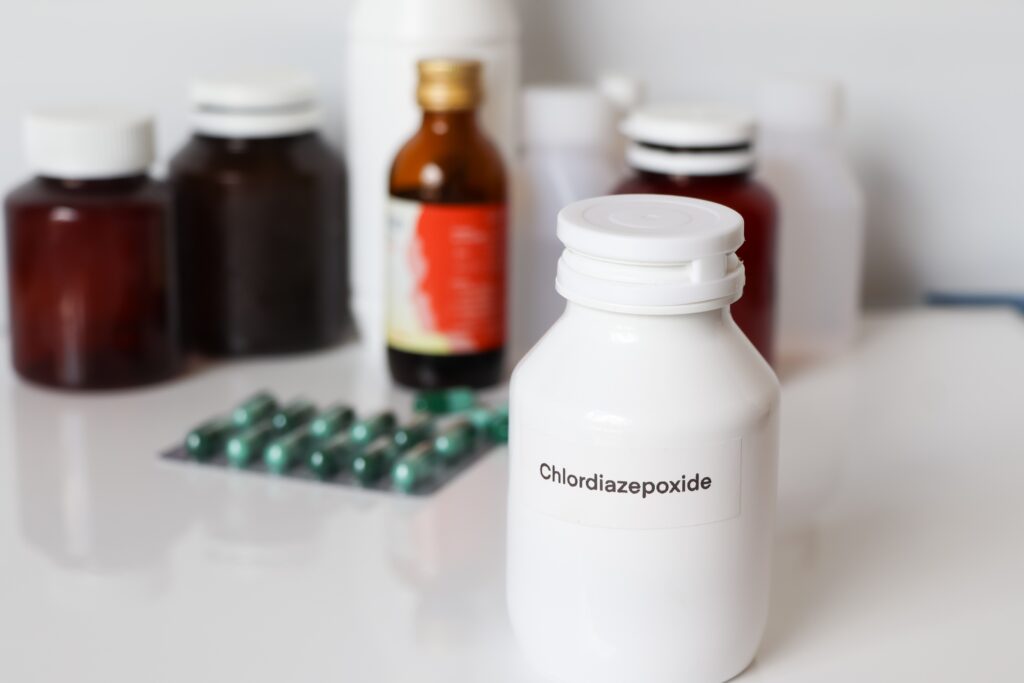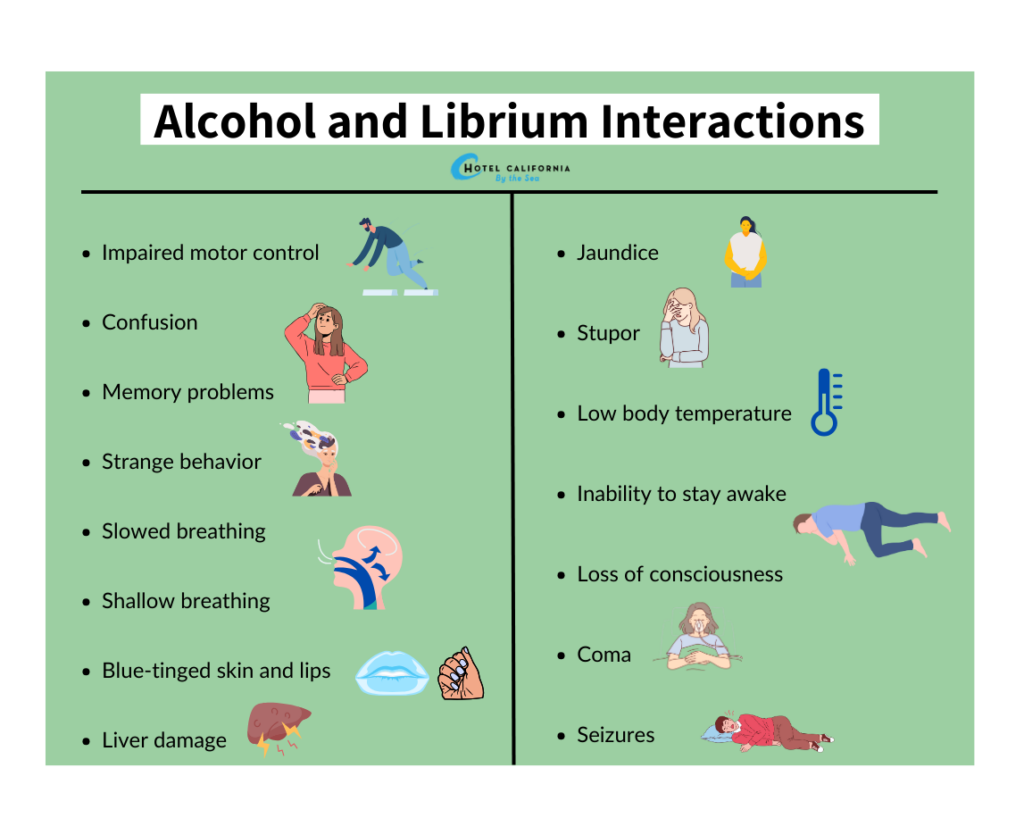Polysubstance Use: Librium and Alcohol
Librium is a prescription medication often used as short-term relief for symptoms of anxiety as well as the general management of anxiety disorders and withdrawal symptoms of acute alcoholism. It contains anti-anxiety, sedative, appetite-stimulating and myorelaxant properties. Its primary use is to help treat withdrawal symptoms for alcohol use disorder.

Research has found that physicians write more than 50 million prescriptions each year for benzos such as Librium. According to the American Psychiatric Association, between 11-15% of American households have prescription benzos readily available in their medicine cabinets at home. This prescription benzos is a Schedule IV Controlled Substances and has a potential for dependence, as most users abuse the drug for its calming and sedative effects.
What is Librium?
Librium is the brand name for the medication chlordiazepoxide. It was the first benzodiazepine to be introduced into the drug market in 1960. The appearance of the drug is as a white crystalline substance made into multicolored capsules. Like other benzos, Librium works by binding to and enhancing the GABA receptors in the brain. GABA is a neurotransmitter located throughout the entire body. When Librium attaches to these receptors it impacts the central nervous system to create a calming and relaxing effect.
Librium is a long-acting benzos. It can take up to several hours before users can begin to feel its full effects. The drug’s half-life is between 24-48 hours. Because of its potential for abuse, Librium is most often prescribed for short-term use. Even taking a prescribed dosage for 6-8 weeks can cause a user to experience withdrawal symptoms when drug use has ended. When dependence on the drug has developed, it is best to gradually taper off the medication to avoid any uncomfortable withdrawal symptoms such as tremors, muscle cramps, vomiting and sweating.
Side Effects of Librium Abuse
- Fatigue
- Sedation
- Developing or worsening depression and anxiety
- Dizziness
- Slurred speech
- Weakness
- Confusion and forgetfulness
- Nervousness
- Mania
- Weight gain
- Hallucinations
- Hypotension
- Hypersalivation
With long-term use of the drug, users can develop life-threatening side effects such as blood conditions, renal dysfunction and acute liver damage. Abusing Librium for a long period of time can also impact and change neural pathways in the brain as it adjusts to the constant presence of the drug. This is what creates physical dependence and the inability of the brain and body to function normally without the Librium.

Signs you may have an addiction to Librium
- You have intense cravings and urges to use Librium
- You spend all your money on buying and using Librium
- You hide your drug-using behaviors from friends and family
- You feel intense shame about your drug use
- You feel anxious and frustrated when using and recovering from Librium
Librium for Alcohol Withdrawal
Alcohol use disorder can be a dangerous condition. This is due to changes in the brain chemistry of the user who has adapted to the presence of alcohol. Alcohol can also impede GABA neurotransmitters from functioning correctly. Alcohol withdrawal can also be just as dangerous due to the physical and psychological impact on the brain and body. Users often develop intense depressive side effects, especially after prolonged drinking habits from alcohol use disorder.
The symptoms of alcohol use disorder usually begin within 12-48 hours after the initial dose. This is because alcohol is metabolized fairly quickly compared to many other substances. Common side effects of alcohol withdrawal include nausea, vomiting, insomnia, tremors, irritability, anxiety, agitation hyperthermia, delirium and hypertension.
Many alcohol detox treatment programs use Librium to help treat symptoms of alcohol withdrawal. According to physicians and addiction clinicians, it can be a safe treatment with short-term use under the care of a clinical treatment plan. How does this medication assist in relieving symptoms of alcohol withdrawal? It helps to regulate communication between neurotransmitters, which can often be thrown off balance during periods of alcohol withdrawal. The brain has become so accustomed to compensating for the effects of alcohol that Librium works to normalize brain activity after a sudden imbalance from removing the addictive substance. Because this psychotropic drug can become habit-forming if used over a long period of time, it is only prescribed for short-term treatment in alcohol use disorder.
Librium is used during the detox stage of severe alcohol use disorder treatment. There are two main stages of dosing when used for detox. The initial stage of the drug helps users cope with the intense wave of symptoms that follow the first 12-48 hours of alcohol withdrawal. In the second stage, the drug is methodically and gradually tapered until the medication is no longer necessary.
Check Your Insurance Coverage for FREE
Find out if your insurance covers addiction treatment in minutes. We accept most insurance!
Librium and Alcohol
The polysubstance abuse of Librium and alcohol is more common than we know. In fact, statistics show that more than 80% of benzos abuse happens to be part of polydrug abuse. Both substances interact with the GABA neurotransmitter and produce depressive effects on the central nervous system.
When alcohol and Librium are combined, the depressive effects from both drugs are amplified and can produce severe sedation, toxicity, and a higher risk for overdose. Overdose symptoms such as blackouts, increased heart rate, hallucinations and respiratory depression are serious risks that can lead to death. Librium users are recommended not to drink alcohol while taking any Benzo medication due to the risks of adverse side effects.
Side Effects of Librium and Alcohol Abuse
- Impaired motor control
- Confusion
- Memory problems
- Slurred speech
- Changes in behavior
- Slowed and shallow breathing
- Liver damage
- Jaundice
- Low body temperature
- Inability to stay awake
- Loss of consciousness
- Coma and seizure
- Increased risk of overdose
Why do users mix and combine these substances? One of the main reasons for polydrug use of Librium and alcohol is due to a developed tolerance for Librium and the urge to experience stronger effects that can be enhanced with alcohol. Others use Librium to intensify the feelings of alcohol intoxication. Some users self-medicate in order to numb physical or psychological pain, and others are simply experimenting with drug use.
Polydrug users can also experience urges and cravings for the substances. Those who have become addicted want to quit or cut back but are unable to due to their developing tolerance and need to feel its effects. Because of this, people will continue to use the drug combination despite the negative consequences on account of the substance use.
Reach out to Hotel California by the Sea
We specialize in treating addiction and other co-occurring disorders, such as PTSD. Our Admissions specialists are available to walk you through the best options for treating your addiction.
Treatment of Polydrug Abuse
Librium is an anti-anxiety sedative benzos that can create a high similar to alcohol intoxication. The combination of the two substances causes significant adverse effects that can lead to toxicity. Short-term effects lead to overdose, while long-term use can lead to lasting liver damage. Ironically, Librium is a medication commonly used to help treat symptoms of severe alcohol withdrawal. Under the care and support of a behavioral treatment program such as Hotel California by the Sea, clients can receive polydrug abuse treatment for substances such as Librium and alcohol.
We provide treatment in all levels of care ranging from detox, residential inpatient and outpatient programs such as PHP and IOP. We specialize in treating co-occurring mental health disorders and utilize effective techniques such as cognitive behavioral therapy, dialectical behavioral therapy and family therapy. These evidence-based methods help clients understand the underlying root causes of their addiction. Hotel California by the Sea treats addiction by addressing every aspect of the disease physically, emotionally and psychologically. We are dedicated to helping our clients overcome their addictions.
References:
https://zinniahealth.com/substance-use/librium/with-alcohol
https://www.rehab4addiction.co.uk/alcohol-withdrawal-symptoms/librium-alcohol-withdrawal
https://www.rehab-recovery.co.uk/addiction-detox/alcohol-detox/librium
https://www.rehabcenter.net/polysubstance-abuse/librium-and-alcohol
https://zinniahealth.com/substance-use/librium/side-effects
https://www.ncbi.nlm.nih.gov/books/NBK547659
https://www.addictioncenter.com/benzodiazepines/librium
https://www.rxlist.com/librium-drug.htm#indications
